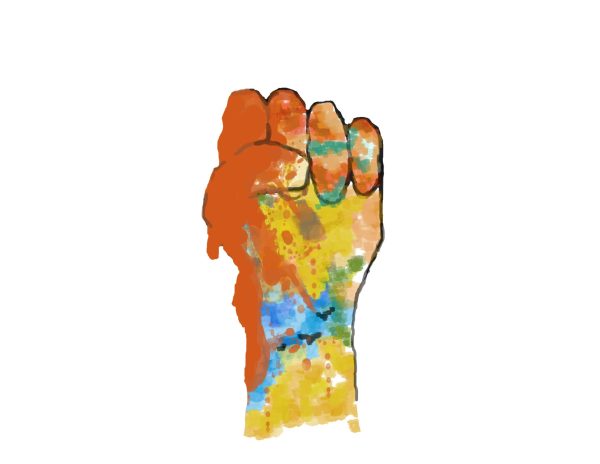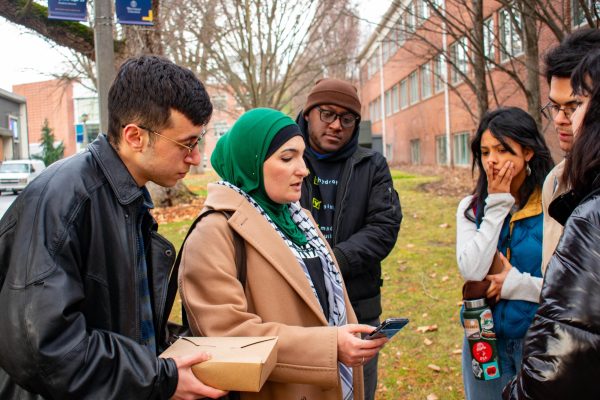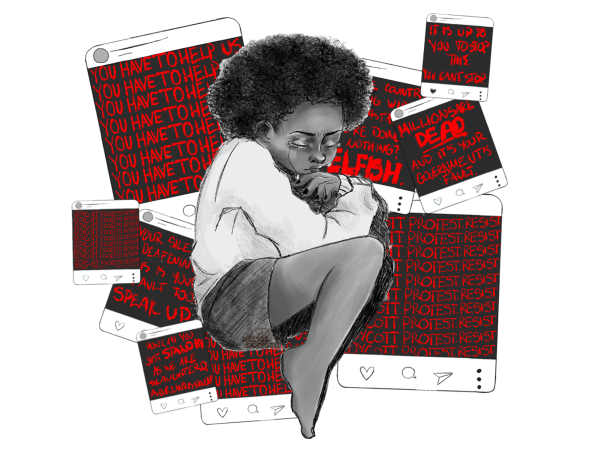Whitman Finds Its Voice
In the wake of Donald Trump’s election, activists in the Whitman community work to channel an awakened political fervor.
February 2, 2017
Since the election of Donald Trump, activists in the Whitman community have described a flood of political energy in search of outlet. Groups are mobilizing to build relationships and organize a community anxious to engage with a presidential administration embroiled in controversy unprecedented in modern American history. Some of these local activists have been involved with social action-oriented clubs their entire time here at Whitman. But for many, the election marks a watershed moment in their own political confidence and consciousness: the apolitical pay attention; the attentive engage.
This week, numerous demonstrations throughout the world were organized in opposition to President Trump’s recent immigration ban. One of them gathered last Monday at Walla Walla airport. Among the primary organizers was Maia Watkins.
Unlike most Whitman students, Senior Maia Watkins matriculated on the scene with some down-home experience in grassroots activism. Eugene, “one world,” etc. Mama showed her how to do it in the Bush years. And yet, early on in her time here at Whitman, she was reluctant to spearhead social or political causes. Didn’t think she knew the community well enough: “I didn’t feel like I knew what I was doing.”
After the order was issued, Watkins and Whitman senior Dessie Weigel attended a meeting of the Walla Walla Progressives, and expressed interest in a solidarity rally. They were told to “make it happen.” In just over a day, via Facebook and community outreach, they did just that.
In an email to the Wire, Norman Osterman of the Walla Walla Progressives wrote that the group was “amazed at the excellent organization of the demonstration on short notice and the number of participants. We know that it will take ongoing commitment from [young people] to overturn the present nightmare we find ourselves in. [Young] folks will be a key factor because you can’t buy youth and enthusiasm.“
The success of the demonstration affirmed an appreciation Watkins has developed that “in most situations no one knows what they’re doing. But someone needs to do something if anything is to happen.”
—
The early days of the Trump’s administration at Whitman college have included one letter-writing party at an off-campus house and another organized by Divest Whitman. On Wednesday, the Intercultural Center hosted an interfaith gathering in solidarity with Muslims who are “feeling under assault.” Last week’s Women’s march was among the largest demonstrations in Walla Walla history. Many students reported that it was their first-ever public act of civic engagement.
Organization leaders describe a push to give an outlet to people in the Whitman community who want to take action, but don’t know how.
Megumi Rierson is on the Planned Parenthood generation action team on campus, which, under the direction of Walla Walla Planned Parenthood, has organized events from sign making parties to sex education in local high schools. She said that “people… feel a little wayward in terms of their political activism. In terms of knowing the severity of the issues at hand and not knowing how to get involved. And we’re trying to bridge that gap.”
Garrett Atkinson, co-president of the Whitman College Republican club, sees the club as giving voice to dissident opinions on campus, so that all sides of a debate might be considered on their merits. His concern is in distinguishing between rhetoric and the ideas they represent. He wants the complexity and legitimacy of the issues better-acknowledged in on-campus discourse.
Cassandra Otero, who helped organize last week’s screening of the documentary “Jornaleros,” said that, as she’s gained experience, her “conception of activism has changed a lot. I thought it was doing things until you’re almost or at or past your breaking point, just organizing things, emailing all the time, making those networks, but realizing with this event … it’s not just about providing resources to people. It’s not just about having that space. It’s creating those relationships where people would want to go to that space.”
Last Sunday, Politics Professor Aaron Bobrow-Strain, who advises the Borders as Method club (of which Otero is a member), dispatched the first of what will be weekly Immigration Action Bulletins. In an email to The Wire, Bobrow-Strain wrote that he “was overwhelmed by trying to keep track of all the fronts people of conscience have to fight on right now.” So he decided to focus on his area of relative expertise: immigration policy.
“The idea,” he wrote, “is to provide a brief overview of what’s happening in immigration politics every week, a list of concrete actions people can take and background information and talking points to help make taking those actions as easy as possible. It’s aimed at people who want to make our communities safe and welcoming for immigrants, but don’t feel like they have the information or tools to do that.”
—
This week, Whitman president Kathy Murray circulated an email condemning the executive order. She wrote that, “Now more than ever it is important to communicate directly with our elected officials. I have reached out to our own representatives to make our stance on this issue known and want to encourage all of you to make your views known.”
Whitman graduate Sarah Koenigsberg 02’, a local documentary filmmaker whose work focuses on artistic and social causes, hosted “pretty much the worst party I’ve ever thrown” on election night. As the stomachs of her and her friends twisted in a hollow despair well-characterized throughout the Whitman community, they came across “Indivisible,” a how-to Google Document created by liberally-minded congressional staffers, offering a step-by-step blueprint for grassroots political action dedicated to resisting the edicts of the Trump administration and a Republican-controlled Congress. This was perfect for Koenigsberg and friends: “We’re all busy and we didn’t know how to be activists.”
She said, somewhat in jest, that the election results tossed her into a “major identity crisis … I’ve liked to think my work has this impact. But if [enter the plights of numerous institutions and causes for which she has worked to promote], then what the fuck is the point?!”
Since then, Koenigsberg has been involved in the founding and early development of Walla Walla Indivisible, which works to organize and channel energy formerly dedicated to the “the Facebook downward spiral of doom,” to things like calling up your representative. She said she’s found that, “we’re a lot closer to our representatives than we think.”
She invites interested students to connect with Walla Walla Indivisible, to compartmentalize time and find that hour or two a week to focus on concretely supporting an issue you care about. “We want to pace ourselves with the idea that we’re gonna be doing this for the next four years at least,” she said. “This is what it means to be an American now.”









